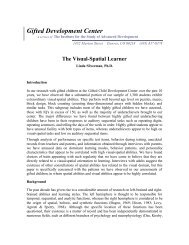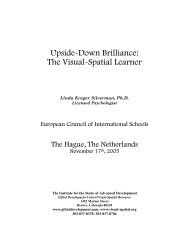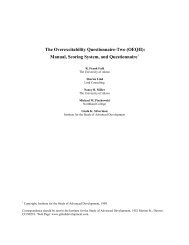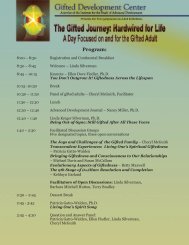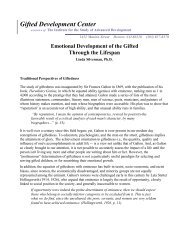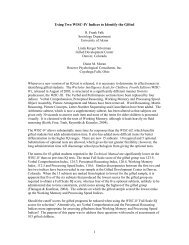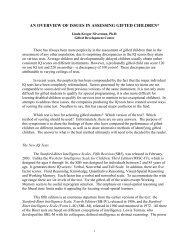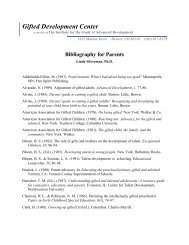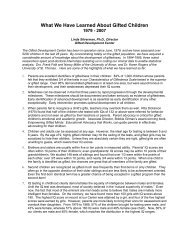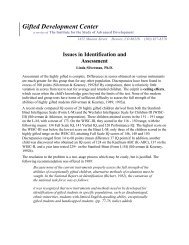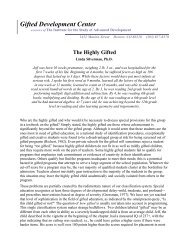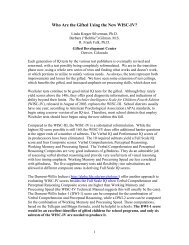THE CONUNDRUMS OF SUCCESS - the Gifted Development Center
THE CONUNDRUMS OF SUCCESS - the Gifted Development Center
THE CONUNDRUMS OF SUCCESS - the Gifted Development Center
You also want an ePaper? Increase the reach of your titles
YUMPU automatically turns print PDFs into web optimized ePapers that Google loves.
more paintings to paint, more mysteries of <strong>the</strong> universe to solve, it is that striving whichbrings satisfaction and fulfilment.And <strong>the</strong>re I think we have it. There I think we find what success truly means. Not justquantifiable performance, not just tangible products. Success is <strong>the</strong> sense of realising avision, of fulfilling one’s life purpose.There too I think we have our justification for nurturing ability, intrinsically differentfrom <strong>the</strong> limited focus of talent development, intimately linked to <strong>the</strong> inner self of <strong>the</strong>individual, ultimately linked to <strong>the</strong> greater good of all humanity.This does not just apply to extraordinary human beings like those I’ve just listed, nor is itconfined to <strong>the</strong> gifted. It applies to all of us, those of us who are not gifted as well asthose of us who are. Ask yourself why you are here today. How many of us are heresolely to gain some sort of credit on our CVs? Or are we here because this might help usin fulfilling our important life role as caring parent or caring teacher?Thus what I want to propose to you today is:- that <strong>the</strong> child-centred approach which guides us so wisely in <strong>the</strong> earlier yearsis most fittingly balanced by an approach which guides students towardsunderstanding and achieving fulfilment of <strong>the</strong> inner self in <strong>the</strong>ir adult life role,and- that that is what needs to shape our education system as we consider forwardfor our students to life beyond school.Annmarie Roeper makes a related and important point when she argues that success is infact a natural byproduct of an education that concentrates on <strong>the</strong> development of <strong>the</strong> Self.(cited in Silverman, in press, p.24). It’s somewhat like an upside-down version of <strong>the</strong> oldsaying, “Look after <strong>the</strong> pennies and <strong>the</strong> pounds will look after <strong>the</strong>mselves”, or cents anddollars in today’s money. If we truly care for <strong>the</strong> inner self of <strong>the</strong> gifted child, trulyrespect and value <strong>the</strong> insights and imaginings and thoughts that that inner self producesand do all we can to nurture that, <strong>the</strong>n that child’s own natural drive and vision will bringabout that translation into what <strong>the</strong> child actually does, creates or produces.Re-defining successWhen we consider this approach, it becomes immediately apparent how far it is removedfrom what we have been encouraged to see as “success” in our materialistic, competitivesociety. Both in school and extending beyond school, success has come to mean doingbetter than one’s fellows. Winning. Being first. Earning more. Owning more. Havingmore power than o<strong>the</strong>rs.Contrast this with a story Renzulli tells in an article of his I shall refer to shortly: he tellsus about Melanie, a little girl who over a period of some months helped a partiallysighted younger boy to move from being teased and rejected by o<strong>the</strong>r children to winning15



